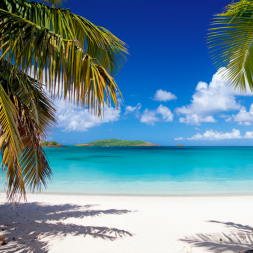How Can NPs Practice in Puerto Rico?
Who hasn’t dreamt of running away and living on a beautiful island somewhere? As luxurious as views of pristine beaches and captivating landscapes right outside your doorstep sounds, actually making island living a reality can come with a lot of fears and hesitation. Not only would you have to leave behind all you know, but if you love practicing as a nurse practitioner or aren’t in a position where retirement is possible yet, at the end of the day, you’ll still have to make a living somehow. In many regions, the advanced practice nursing role isn’t as developed or as highly regarded as it is in the United States, but fortunately, we’ve got some good news for you!
As neither a state nor a county, but an unincorporated territory (or Free Associated State) of the U.S., Puerto Rico may just be the place where you can make island living a reality. Often referred to as the Commonwealth of Puerto Rico, the territory has its own flag, language, national anthem, cultural background and history, but its residents are actually American citizens. The unique relationship between the US and the island allows Puerto Ricans and Americans to move and live freely between the two areas without the hassle of applying for citizenships or visas in either location.
While there are a few notable differences as far as taxation and politics goes, overall the process of moving to the Island of Enchantment is pretty similar to moving from one state or another. As an added bonus, many aspects of the nursing profession in the United States are very similar in Puerto Rico, including the various roles in advanced practice nursing.
 Requirements for Nursing in Puerto Rico
Requirements for Nursing in Puerto Rico
Like the U.S., depending upon what nursing role a Puerto Rican wants to work in, he or she must either must attend an associate, bachelor’s or master’s program in nursing, all of which must be accredited or recognized by the Council of Higher Education of Puerto Rico. Upon completing their respective programs, nursing graduates have to pass a board certification exam and can opt to take the NCLEX if they plan to practice in the States. Nursing graduates also have to obtain licensing with the Commonwealth of Puerto Rico Board of Nurse Examiners before they can begin their practice, and must also renew their licenses every three years.
How Advanced Practice Nursing in P.R. Compares to the U.S.
The nurse practitioner profession in Puerto Rico is fairly new, but has continued to evolve and overall, mimics the role in the U.S. Under its Nurse Practice Act, Puerto Rico defines its different nursing roles as categories and categorizes all advanced practice nurses (which includes NPs, nurse anesthetists, midwives, etc.) as nurse specialists.
Like APNs in the U.S., nurse specialists have to attend a master’s nursing program with a specific area of concentration such as family, mental health, adult care, etc. Once licensed, nurse specialists have autonomy and can practice independently based on their level of critical judgement, their mastery of skills and the specialized knowledge they possess in the category under which they practice. They’re also responsible for directing, collaborating and advising the nursing team in the planning, and the execution and evaluation of direct nursing care offered to patients. Nurse practitioners in P.R. also have treatment and prescribing authorities, however, currently they cannot prescribe controlled substances (although this is a future possibility as the NP role continues to develop).
How NPs in America can Practice as Licensed Nurse Specialists in P.R.
If you are already licensed in the U.S. to practice as an NP or as an advanced practice nurse in another role and are looking to move your practice to the Island of Enchantment, you can apply for licensure through the Commonwealth of Puerto Rico Board of Nurse Examiners. It’s possible that you may be required to take a revalidation exam offered through the board. Bear in mind that because Spanish is the primary language spoken, you may be required to demonstrate fluency.
After the devastation of Hurricane Maria in 2017, unfortunately, many Puerto Rican educated NPs have chosen to leave the island to practice in the U.S. for financial reasons. While you can expect to take a significant pay cut, now more than ever, Puerto Rico has a dire need for healthcare providers and there is no shortage of job opportunities for nurses looking to make Puerto Rico their place of residence.

